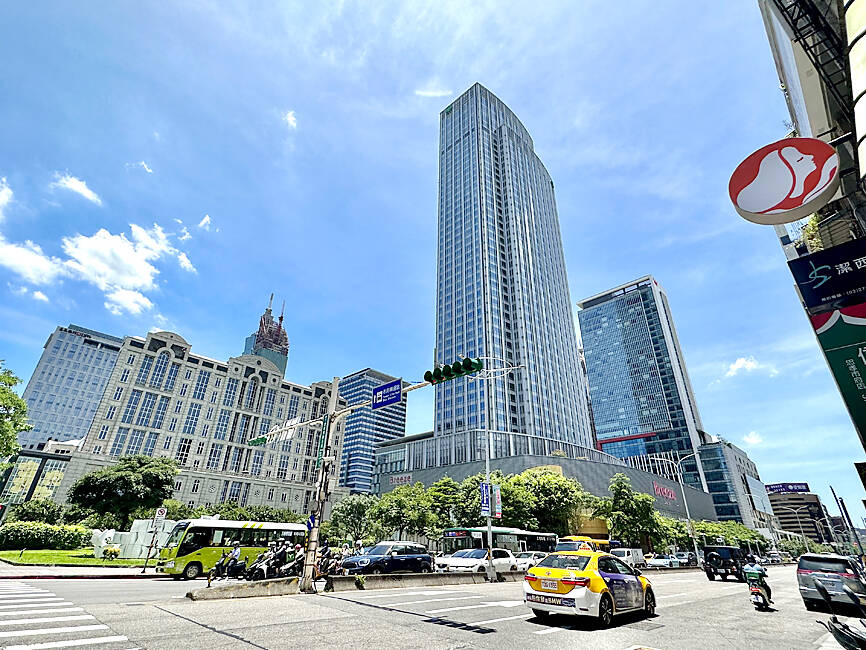The vacancy rate for Grade-A offices in Taipei last quarter was unchanged at 2.7 percent, while rents climbed 1.3 percent from a year earlier, as companies maintained a cautious approach about spending amid economic weakness, property consultancy Jones Lang LaSalle (JLL) Taiwan said on Tuesday.
“The vacancy rate has consolidated within the 3 percent range, indicating the leasing market remains healthy, despite the economic slowdown,” JLL Taiwan said, adding that rent increased due to a tight supply of upscale offices in the city’s prime Xinyi District (信義).
However, economic uncertainty has turned corporate tenants conservative about expanding, which would constrain the pace of rent hikes ahead, the consultancy said.

Photo: Hsu Yi-ping, Taipei Times
JLL Taiwan managing director Kevin Hou (侯文信) said that commercial properties were not spared the impact of the economic slowdown, but nonetheless performed better than expected last quarter.
That was because regular rent income proved a good defense against inflation, a quality that is not easily replaced by other investment tools, Hou said.
The commercial property market might gain further momentum in the second half if the local economy comes out of the woods, Hou said.
In particular, JLL Taiwan said it has spotted growing demand for environmental, social and governance (ESG) green buildings, as Taiwan is seeking to achieve net zero carbon emissions by 2050.
A JLL survey showed that 65 percent of Grade-A office spaces in Xinyi have green architecture certifications, with six buildings owning multiple green certifications.
A considerable number of Grade-A building landlords have introduced plans to help tenants purchase green energy, with life insurers the most active, JLL said.
More than 55 percent of Grade-A offices in Xinyi District operate on green energy and this percentage is likely to rise in line with the global leasing trend, the consultancy said.

RUN IT BACK: A succesful first project working with hyperscalers to design chips encouraged MediaTek to start a second project, aiming to hit stride in 2028 MediaTek Inc (聯發科), the world’s biggest smartphone chip supplier, yesterday said it is engaging a second hyperscaler to help design artificial intelligence (AI) accelerators used in data centers following a similar project expected to generate revenue streams soon. The first AI accelerator project is to bring in US$1 billion revenue next year and several billion US dollars more in 2027, MediaTek chief executive officer Rick Tsai (蔡力行) told a virtual investor conference yesterday. The second AI accelerator project is expected to contribute to revenue beginning in 2028, Tsai said. MediaTek yesterday raised its revenue forecast for the global AI accelerator used

TEMPORARY TRUCE: China has made concessions to ease rare earth trade controls, among others, while Washington holds fire on a 100% tariff on all Chinese goods China is effectively suspending implementation of additional export controls on rare earth metals and terminating investigations targeting US companies in the semiconductor supply chain, the White House announced. The White House on Saturday issued a fact sheet outlining some details of the trade pact agreed to earlier in the week by US President Donald Trump and Chinese President Xi Jinping (習近平) that aimed to ease tensions between the world’s two largest economies. Under the deal, China is to issue general licenses valid for exports of rare earths, gallium, germanium, antimony and graphite “for the benefit of US end users and their suppliers

Dutch chipmaker Nexperia BV’s China unit yesterday said that it had established sufficient inventories of finished goods and works-in-progress, and that its supply chain remained secure and stable after its parent halted wafer supplies. The Dutch company suspended supplies of wafers to its Chinese assembly plant a week ago, calling it “a direct consequence of the local management’s recent failure to comply with the agreed contractual payment terms,” Reuters reported on Friday last week. Its China unit called Nexperia’s suspension “unilateral” and “extremely irresponsible,” adding that the Dutch parent’s claim about contractual payment was “misleading and highly deceptive,” according to a statement

Artificial intelligence (AI) giant Nvidia Corp’s most advanced chips would be reserved for US companies and kept out of China and other countries, US President Donald Trump said. During an interview that aired on Sunday on CBS’ 60 Minutes program and in comments to reporters aboard Air Force One, Trump said only US customers should have access to the top-end Blackwell chips offered by Nvidia, the world’s most valuable company by market capitalization. “The most advanced, we will not let anybody have them other than the United States,” he told CBS, echoing remarks made earlier to reporters as he returned to Washington